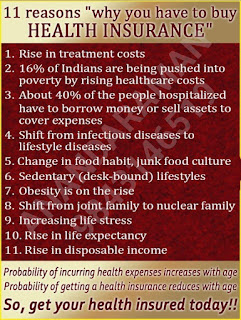Choosing Health Insurance
How to choose the Best Health Insurance Policy?
Health Insurance is designed to take care of one’s healthcare expenses, in case the person faces any sort of medical emergency, be it an illness or an accident that has led to hospitalization(Policies generally cover OPD expenses also). The insured either has to pay such expenses out-of-pocket & is later reimbursed by the insurer or the insurance company settles the bill directly with the hospital.
You should pay heed to following points before choosing a health insurance policy:
Pre & Post Hospitalization Coverage: When one falls sick, one usually consults a physician and gets relevant investigations done for proper diagnosis. The physician may initially prescribe certain medications. In spite of this treatment, if the condition of the patient does not improve the physician advises the patient to get hospitalized for further management of the disease. Such medical expenses incurred before hospitalization are called Pre-Hospitalization Expenses. During hospitalization, a major part of the treatment is complete but some part of the treatment extends beyond the hospitalization. It may involve follow-up visits to the doctor, medicines to be taken or follow-up investigations to be done. Such medical expenses are called Post-Hospitalization Expenses. A good policy will cover 30 days for Pre Hospitalization expenses & 90 days for Post Hospitalization expenses.
Premium: We should compare the premiums of health insurances offered by different insurers for a certain sum of coverage. We can easily get this data from many online health insurance comparison websites. We can save some amount of money through this comparison.
Bed Charge Coverage: It means the amount of money that is covered for each day of your stay at the hospital. You should inquire about whether the policy covers Single Private Room. Many policies provide coverage only if you stay at general ward. Some polices cover till triple or twin sharing. It is generally seen that better the quality of the room, better is the quality of treatment. General ward may not provide the same quality of treatment as that provided by Single Private Room. Your policy should cover Single Private Room or atleast Twin Sharing.
Claim Settlement Ratio: It denotes what is the probability that your insurer will actually pay you if you file a claim. It is one of the most important factor while choosing a policy. Generally we select the policy which is the cheapest. But many a times such policies reject our claims. That turns out to be a complete waste of our premium money and also faith. So always select among the Top 5 policies according to % Settlement Ratio.
Tie-ups with Hospital: Check if the hospitals near your residence are empanelled under the insurance company from which you are to buy the policy. Doing so makes it easier to avail cashless hospitalization as and when the need arises. Cashless hospitalization can be availed only at empanelled network of hospitals ie hospitals with which the insurer has tied up. The essence of cashless hospitalization is that the insured individual need not make an upfront payment to the hospital at the time of admission. Otherwise if you have to make payment by yourself first, then reimbursement of that amount may take a long time. You will have to physically submit the bills and prescriptions which will be verified by your insurer. This process can take 2–3 months. You may face money issues during this interval. So always check whether your policy has tie-ups with maximum number of hospitals especially in your city of residence. You will thus have to make no payment in case of hospitalization and entire expenses will be directly borne by the insurance company.
In-House Claim Settlement: Try to choose those insurers whose claim settlement is not done by 3rd Party Administrators. Some insurers give contract to 3rd party to verify claims (For eg: to check whether the person has actually got admitted, whether the paperwork is complete). Many a times it is seen that such 3rd party agencies harass people during claim settlement & even sometimes reject the claim citing incomplete documentation. The more the number of claims that get rejected, the more these agencies get paid. So, it is better to choose those insurers whose claim settlement is done in house.
Mentioning Pre-Existing Diseases: Never fill your insurance form in a hurry. Do not forget to mention your pre-existing diseases. Doing this may increase your premium amount by a little, but it maximizes the chances of your claim getting approved. If we do not mention our pre-existing diseases and it gets detected during treatment, our claim will get rejected.
Top-Up & Super Top-Up Plans: It is often noted that rising healthcare costs render the cover(sum assured) insufficient. Many people thus have to purchase two policies. For them, these plans come as saver. These top-up plans will cover expenses if bill crosses the sum assured. Top-Up plan will cover additional expenses only for once during the policy period. Super Top-Up plan will cover additional expenses for multiple times during the policy period. So, it is better to go for Super Top-Up plan in case you need these kinds of plans.
Conclusion: So, while choosing your health insurance plan you should first shortlist Top 5 policies according to %Claim Settlement. Cross out those (if any) who do not have Tie-Ups with hospitals in your city of residence. Then cross out those (if any) who do not have In-House Claim Settlement. If are still left with multiple choices then decide according to low premium and bed charge coverage. If you frequently fall ill you should select higher OPD Coverage by paying a little extra with the base plan. You may choose Super Top-Up if you feel that you need a higher amount as coverage.

_page-0001.jpg)
Comments
Post a Comment